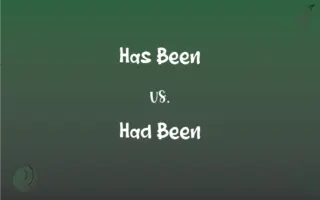Employer vs. Jobseeker: What's the Difference?
Edited by Aimie Carlson || By Harlon Moss || Published on January 16, 2024
Employer offers jobs while jobseeker seeks employment.

Key Differences
An employer is an individual or organization that provides jobs and pays for services rendered. A jobseeker, conversely, is a person actively looking for employment opportunities offered by employers.
Employers are responsible for hiring decisions, often seeking the best candidates. Jobseekers, in contrast, strive to present themselves as ideal candidates to potential employers.
The relationship between an employer and a jobseeker is transactional; the employer offers compensation for work, while the jobseeker provides labor or skills in exchange.
Employers often assess jobseekers based on their qualifications and fit for the role. Jobseekers, on the other hand, evaluate employers based on factors like workplace culture and career growth opportunities.
The power dynamic can vary; employers have the authority to make hiring decisions, while jobseekers have the freedom to accept or reject employment offers.
ADVERTISEMENT
Comparison Chart
Role in Employment
Provides job opportunities.
Seeks job opportunities.
Main Objective
To hire suitable candidates.
To find suitable employment.
Decision-Making
Decides whom to hire.
Decides where to apply.
Needs
Requires staff to operate effectively.
Needs employment for income and career.
Engagement with Job
Offers and manages jobs.
Applies for and accepts job offers.
ADVERTISEMENT
Employer and Jobseeker Definitions
Employer
An employer can be an individual, a company, or an organization.
Her employer, a large tech company, offered excellent benefits.
Jobseeker
A jobseeker is someone actively looking for employment.
The jobseeker attended several interviews this week.
Employer
An employer is a person or entity that hires employees.
The employer advertised several new positions this month.
Jobseeker
A jobseeker may be unemployed or seeking a better opportunity.
Despite having a job, he remained a jobseeker for better prospects.
Employer
An employer is responsible for paying wages or salary.
The employer implemented a new payroll system for timely payments.
Jobseeker
A jobseeker often uses resumes and cover letters to apply.
The jobseeker updated her resume to highlight recent skills.
Employer
An employer often sets work conditions and expectations.
The employer required all staff to attend weekly meetings.
Jobseeker
A jobseeker evaluates potential employers and job offers.
The jobseeker declined an offer due to insufficient benefits.
Employer
An employer may also provide training and development opportunities.
The employer sponsored her for a professional development course.
Jobseeker
A jobseeker may seek employment through various channels.
The jobseeker used an online job portal to find new openings.
Employer
To provide work to (someone) for pay
Agreed to employ the job applicant.
Jobseeker
A person seeking employment.
Employer
To engage the attention or activity of; occupy
Employed himself for an hour reading blogs.
Jobseeker
(British) An unemployed person who needs to prove he/she is looking for work in order to obtain government benefits.
FAQs
What is an employer?
An individual or entity that hires and pays employees.
How does an employer find candidates?
Through job postings, recruitment agencies, or internal referrals.
What tools does a jobseeker use?
Resumes, cover letters, job boards, and networking.
Can an employer be a single person?
Yes, if they hire and pay at least one employee.
What responsibilities does an employer have?
Paying wages, providing safe working conditions, and adhering to labor laws.
How long does a jobseeker usually search for a job?
It varies widely depending on the industry, location, and individual circumstances.
Are employers responsible for employee training?
Often, yes, especially for specific job skills or company procedures.
What does a jobseeker do?
Actively searches for and applies to job opportunities.
How do jobseekers show their qualifications?
Through their resumes, interviews, and sometimes portfolios or work samples.
Do employers look at social media profiles?
Some do, to gain more insight into a candidate’s personality and professionalism.
Are employers required to provide benefits like health insurance?
It depends on the country's laws and the size of the company.
Are all jobseekers unemployed?
No, some may be employed but looking for better opportunities.
Do jobseekers always need a resume?
Typically, yes, but some jobs may require different or additional application materials.
Can an employer reject a candidate without reason?
Yes, but not for discriminatory reasons as defined by law.
Can a company be an employer without employees?
No, having employees is essential to being classified as an employer.
What can jobseekers do to increase their chances of getting hired?
Tailor their applications to each job, network, and develop relevant skills.
Should jobseekers apply for jobs they’re overqualified for?
They can, but employers might hesitate to hire overqualified candidates fearing they will leave soon.
Can a jobseeker negotiate salary and benefits?
Yes, it’s a common and often expected part of the job offer process.
How do employers handle confidential information from candidates?
With care, ensuring it’s used only for employment-related purposes.
Is it okay for a jobseeker to turn down a job offer?
Absolutely, if the offer doesn’t align with their career goals or needs.
About Author
Written by
Harlon MossHarlon is a seasoned quality moderator and accomplished content writer for Difference Wiki. An alumnus of the prestigious University of California, he earned his degree in Computer Science. Leveraging his academic background, Harlon brings a meticulous and informed perspective to his work, ensuring content accuracy and excellence.
Edited by
Aimie CarlsonAimie Carlson, holding a master's degree in English literature, is a fervent English language enthusiast. She lends her writing talents to Difference Wiki, a prominent website that specializes in comparisons, offering readers insightful analyses that both captivate and inform.






































































